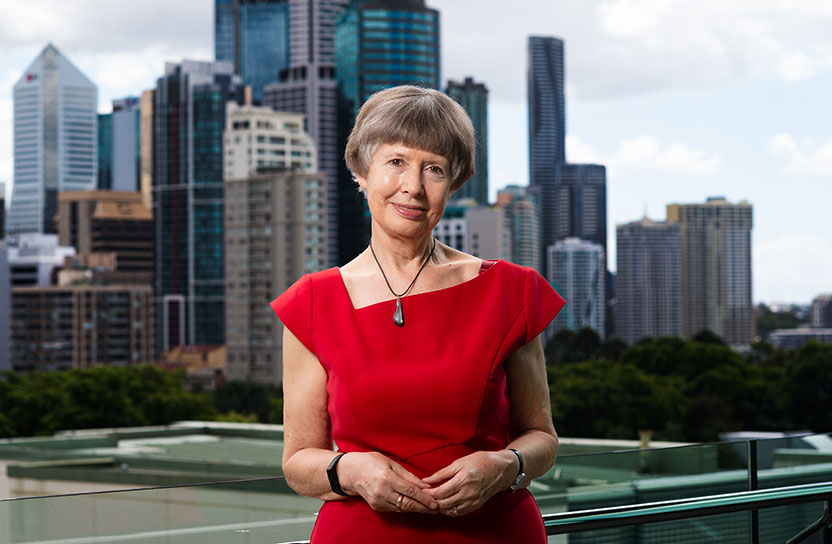Academy Fellow receives top national science prize
- 4 mins read


Academy Fellow Distinguished Professor Lidia Morawska FAA FTSE has been awarded the Prime Minister’s Prize for Science for redefining air pollution science and vastly improving how the world mitigates pollution risk.
Elected to the Academy in 2020, Professor Morawska is one of the world’s foremost authorities on airborne particles, in the context of atmospheric pollution, and its impact on human health and the environment.
President of the Australian Academy of Science, Professor Chennupati Jagadish AC, said this award is a fitting recognition of Professor Morawska’s many years of work to advance clean indoor air.
“Lidia’s research extends beyond an academic pursuit; her tireless advocacy has elevated air quality from a niche concern to a global public health priority,” Professor Jagadish said.
Professor Morawska was named one of TIME magazine's 100 most influential people in 2021 for convincing the World Health Organization to acknowledge COVID-19 could be spread through the air, particularly indoors.
In 2024, Professor Morawska led a multidisciplinary team of experts from around the world to develop a blueprint that can be used as a mandate for indoor air quality.
In a video produced by the Academy about this blueprint, Professor Morawska noted that every drop of water we drink from the tap and the food that we eat are both highly regulated.
“Indoor air, which we take into our lungs 12 times a minute, is not regulated at all.”
Poor indoor air quality poses significant health risks to Australians, who spend around 90% of their time indoors, with exposure to pollutants linked to respiratory illness, allergies, and chronic health conditions.
To galvanise global action on clean indoor air, Professor Morawska took part in organising a high-level, Academy-led event which took place on the sidelines of the 80th UN General Assembly in September 2025 at the UN headquarters.
At this event, more than 150 organisations signed a global pledge to formally recognise clean indoor air as essential to health and wellbeing.
“Lidia has been essential to the international effort calling for recognition of clean indoor air as a fundamental human right,” Professor Jagadish said.
2025 also marks the inaugural Prime Minister’s Prize for Aboriginal and Torres Strait Islander Knowledge Systems, awarded to Malgana man, Professor Michael Wear, founder of Tidal Moon, Australia’s first Indigenous-owned and led sea cucumber fishery and marine restoration enterprise.
Drawing on his deep knowledge of Saltwater Country, culture and science, Professor Wear has developed a viable commercial fishery model for harvesting sea cucumbers, while also collecting critical conservation data through culturally directed methods.
“I warmly congratulate Professor Wear. We are strongest when we work together, bringing to bear all sources of knowledge to improve our lives and environment," Professor Jagadish said.
The Academy congratulates all the recipients of this year’s prizes, which represent Australia's highest recognition of scientific excellence.
Read the Prime Minister's media release
Prime Minister’s Prize for Innovation: Dr Vikram Sharma, recognised for translating Australian research in quantum science into world-leading cybersecurity solutions. In 2008, Dr Sharma founded QuintessenceLabs in Canberra, a leader in Australia’s growing national quantum industry.
Malcolm McIntosh Prize for Physical Scientist of the Year: Professor Yao Zheng, recognised for groundbreaking work to produce clean hydrogen directly from seawater, helping to accelerate Australia’s green hydrogen industry in the transition to net zero. In 2024, Professor Zheng won the Academy’s Le Fèvre Medal.
Frank Fenner Prize for Life Scientist of the Year: Dr David Khoury, recognised for using applied mathematics to translate scientific research into actionable evidence. These outcomes have guided drug development for malaria and vaccine policies for COVID-19 and mpox.
Prize for New Innovators: Dr Nikhilesh Bappoo, recognised for developing novel and accessible medical technologies, including ultrasound-based technology to aid cannulation and solutions to help prevent heart disease. He is driven by his vision of a world where no life is lost because healthcare was too complex, too late or out of reach.
Prime Minister’s Prize for Excellence in Science Teaching in Primary Schools: Mrs Paula Taylor, recognised for transforming STEM education in ACT primary schools. Mrs Taylor brings to the classroom innovative, real-life learning experiences that engage students of all abilities and inspire a lifelong passion for science. She has worked with more than 10,000 students and 480 classroom teachers in her role at the ACT Education Directorate’s Academy of Future Skills.
Prime Minister’s Prize for Excellence in Science Teaching in Secondary Schools: Mr Matt Dodds, recognised for his creative teaching methods to equip students from rural areas and diverse backgrounds with the STEM knowledge and skills they need to thrive in their futures. Mr Dodds has dramatically increased the number of female students studying physics at Glen Innes High School in NSW and inspired many students into further STEM study and careers.





